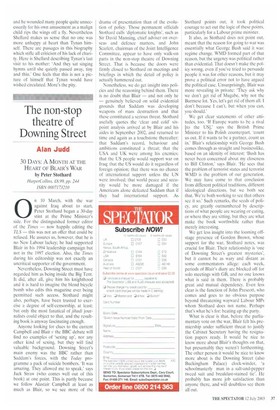The non-stop theatre of Downing Street
Alan Judd
30 DAYS: A MONTH AT THE HEART OF BLAIR'S WAR by Peter Stothard HarperCollins, £8.99, pp. 244 ISBN 0007173210
On 10 March, with the war against Iraq about to start, Peter Stothard began a 30-day stint at the Prime Minister's side. For the distinguished former editor of the Times — now happily editing the TLS — this was not an offer that could be refused. He assures us, however, that he is no New Labour lackey; he had supported Blair in his 1994 leadership campaign but not in the 1997 election. Also, the Times during his editorship was not exactly an uncritical supporter of the government. Nevertheless. Downing Street must have regarded him as being inside the Big Tent. It did, after all, give him his knighthood and it is hard to imagine the blond bicycle bomb who edits this magazine ever being permitted such access. Stothard might also, perhaps, have been trusted to exercise a degree of self-censorship, at least; but only the most fanatical of jihadi journalists could object to that, and the resulting book is anyway fascinating enough. Anyone looking for clues to the current Campbell and Blair v the BBC debate will find no examples of 'sexing up', nor any other kind of sexing, but they will find valuable background. Downing Street's main enemy was the BBC rather than Saddanis forces, with the Today programme a pack of suicide bombers. 'It was amazing. They allowed me to speak,' says Jack Straw (who comes well out of this book) at one point. This is partly because we follow Alastair Campbell at least as much as Blair, so we see more of the
drama of presentation than of the evolution of policy. Those permanent officials Stothard calls 'diplomatic knights', such as Sir David Manning, chief adviser on overseas and defence matters, and John Scarlett, chairman of the Joint Intelligence Committee, appear to have only walk-on parts in the non-stop theatre of Downing Street. That is because the doors were firmly closed to Stothard on meetings and briefings in which the detail of policy is actually hammered out. Nonetheless, we do get insight into policies and the reasoning behind them. There is no doubt that Blair — and not only he — genuinely believed on solid evidential grounds that Saddam was developing weapons of mass destruction and that these constituted a serious threat. Stothard usefully quotes the 'clear and cold' sixpoint analysis arrived at by Blair and his aides in September 2002, and returned to time and again as a touchstone thereafter: that Saddam's record, behaviour and ambitions constituted a threat; that the USA and UK were among his enemies; that the US people would support war on Iraq; that the US would do it regardless of foreign opinion; that there was no chance of international support unless the UN were involved; that world peace and security would be more damaged if the Americans alone defeated Saddam than if they had international support. As Stothard points out, it took political courage to act out the logic of these points, particularly for a Labour prime minister. It also, as Stothard does not point out, meant that the reason for going to war was essentially what George Bush said it was: regime change. WMD formed part of that reason, but the urgency was political rather than evidential. That doesn't make the policy wrong, even if you've tried to persuade people it was for other reasons, but it may prove a political error not to have argued the political case. Unsurprisingly, Blair was more revealing in private: 'They ask why we don't get rid of Mugabe, why not the Burmese lot. Yes, let's get rid of them all. I don't because I can't, but when you can, you should,' We get clear statements of other attitudes, too. 'If Europe wants to be a rival [to the US],' says the British Prime Minister to his Polish counterpart, 'count us out. If it wants to be a partner, count us in.' Blair's relationship with George Bush comes through as straight and businesslike, based on an identity of interest: 'Bush has never been concerned about my closeness to Bill Clinton,' says Blair. 'He sees that the problem of terrorist states and terrorist WMD is the problem of our generation. We may have come to that conclusion from different political traditions, different ideological directions, but we both see that. We're both working to see that others see it so.' Such remarks, the seeds of policy, are greatly outnumbered by descriptions of what people are wearing or eating, or where they are sitting, but they are what make the book worthwhile rather than merely interesting. We get less insight into the looming offstage presence of Gordon Brown, whose support for the war, Stothard notes, was crucial for Blair, Their relationship is 'one of Downing Street's greatest mysteries', but it cannot be as wary and distant as some commentators allege: each week, periods of Blair's diary are blocked off for solo meetings with GB, and no one knows what is said in them. There is probably great and mutual dependency. Even less clear is the function of John Prescott, who comes and goes to no obvious purpose beyond threatening wayward Labour MPs whom Stothard does not name. Perhaps that's what he's for: beating up the party.
What is clear is that, before the parliamentary vote on the war, Blair felt his premiership under sufficient threat to justify the Cabinet Secretary having the resignation papers ready. It would be nice to know more about Blair's thoughts on that, but presumably they weren't forthcoming. The other person it would be nice to know more about is the Downing Street (also Buckingham Palace) clock-winder, 'a schoolmasterly man in a salt-and-pepper tweed suit and breakfast-stained tie'. He probably has more job satisfaction than anyone there, and will doubtless see them all out.


































































 Previous page
Previous page